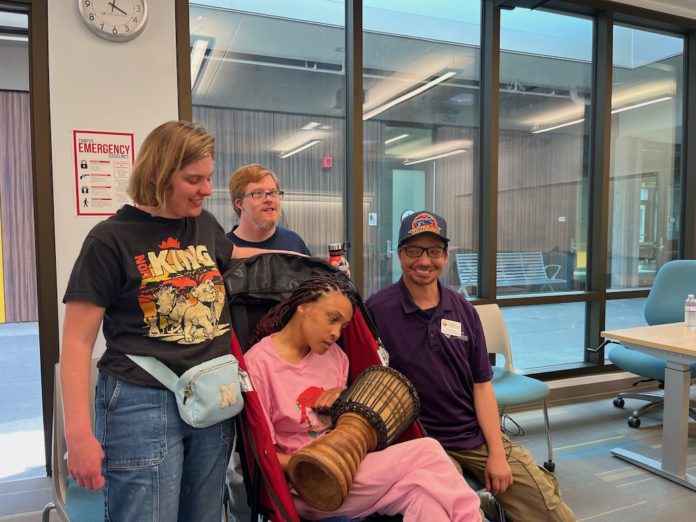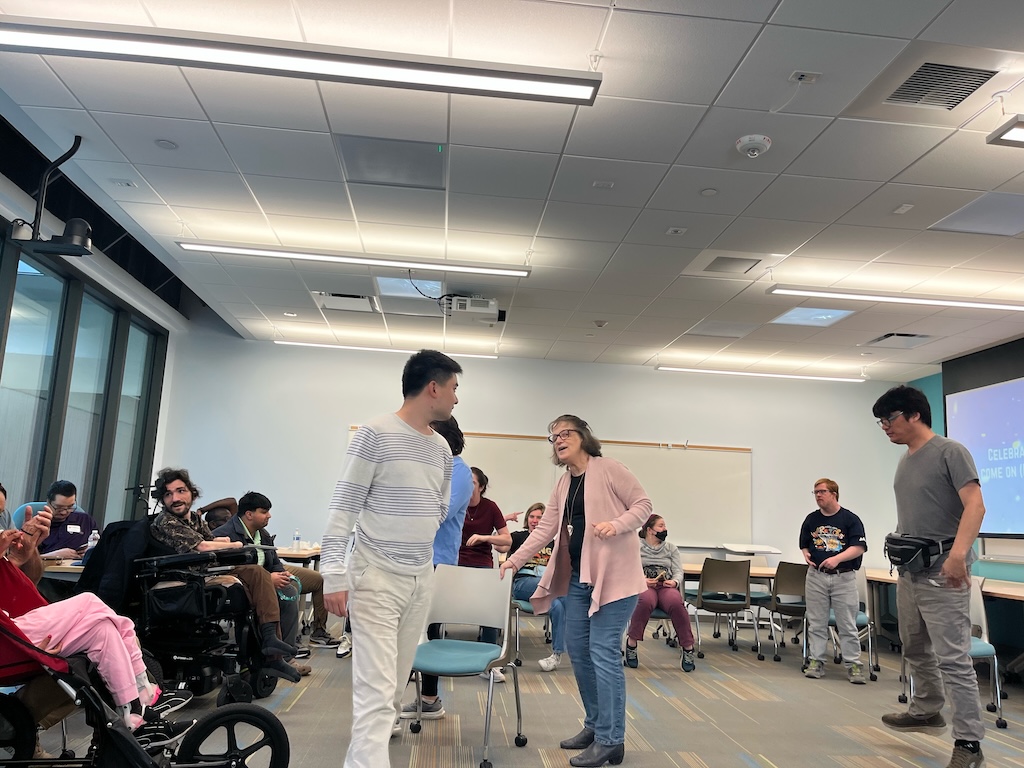
Various instruments, such as tambourines and maracas, ring out during the Thursday afternoon “Rhythm of Life” drum circle at the College of Adaptive Arts, an educational institution for students with intellectual and developmental challenges.
Everyone is attempting to follow the beat, something they work on throughout the six-month-long course—one of many offered at its Saratoga location.
“The program offers a level of extra learning, new opportunities and such while being able to adapt to a lot of needs—like, there are certain students who are almost entirely nonverbal,” said former student Emma Luong. “There are students who have extreme mobility issues, but still take things like dance classes or reading classes.”
The College of Adaptive Arts started back in 2009 from a seedling idea of helping challenged individuals. The first lesson was in a dance studio. It taught musical theater to just nine students. The program has now evolved to reach many people across the country—and the world. “We do have students in 18 other states and one international student from Nigeria,” said Nicole Kim, CAA’s executive director.
The program offers more than 80 courses, the most popular being Rhythm of Life and Joy of Baking. Each class meets once a week and is an hour long, similar to a regular college.
For those who live further away, the college offers online classes as well to remain accessible to all. The college is continuing to grow. School administrators want to offer more in-person courses for those who are enrolled in their online program at the moment.
“We want to expand with physical locations in every community college campus,” Kim said. “That’s the goal.”
For now, the college has established its only permanent site on the West Valley College campus, with the help of Swenson Builders. The building was originally slated for demolition, but CAA asked if they could use the site. West Valley agreed and the Swenson company offered to fix it up. They added new fixtures to the building, including a bathroom and an observation deck.

(Aradhita Singh / Los Gatan)
Kim says West Valley has been quite helpful over the years.
“We have an arrangement with them,” Kim said. “We pay some subsidized rent and they are an amazing partner.”
The program itself is not an adult daycare model, but rather is meant to offer genuine higher education to disabled people.
“We provide a collegiate experience for adults with intellectual developmental disabilities,” said Kim.
CAA helps students become a part of the workforce, turning them into independent individuals in society. However, there is no requirement to graduate and students are allowed to stay as long as they are interested in taking courses.
“We are a lifelong learning institution, and students can come back as much as they want,” remarks Kim. “We have students in their 60s. Most of our students, I want to say the average time they’ve been with us is 10 years.”
CAA also offers students a chance to join their staff as an apprentice.
“It’s a way to start employing someone without as much of a worry of if they went to a standard minimum wage job in the area and their boss didn’t understand certain needs or certain accommodations,” said Luong.
Apprentices can focus on different subjects, including technology.
One such person is 21-year-old Los Gatos resident Arjun Seshadri.
Seshadri dealt with learning challenges in classes at Blossom Hill Elementary, Fisher Middle School and Los Gatos High. He now attends San Jose State University for business.
Seshadri enrolled in the CAA’s IT apprenticeship program in 2024 and has learned various tech skills, such as troubleshooting.
His mom, Sruba, told the newspaper the school helps to increase confidence and self-esteem amongst the students and apprentices.
Each course fuels different interests and prepares students for life in the wider world, she explained.
CAA, Sruba added, opens a world of possibilities for those who’ve faced challenges in the educational system throughout their life.










I will be working at the College of Adaptive Art